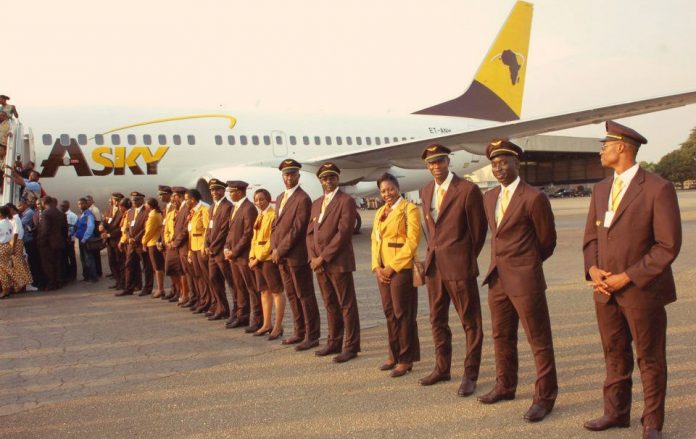Cooperation and connectivity will be the main themes of the 47th General Meeting of the African Airlines Association (AFRAA), to be hosted November 8-10 in Brazzaville, Republic of Congo, by Equatorial Congo Airlines (ECAir) the country’s national carrier.
At stake are the facilitation of trade and ability of African companies to link into the global supply chains, says a July 2014 report published by the International Air Transport Association (IATA), the trade association for most of the world’s airlines, in collaboration with AFRAA.
At present, most intra-African aviation markets remain largely closed, limiting the growth and development of air services and, in turn, the potential for aviation to be a lever for economic growth and development, the report says.
Aviation in Africa currently supports some 6.9 million jobs and more than $80 billion in gross domestic product. In the decade to 2012, African air transport increased by 6.6 percent, the second highest growth after that of the Middle East. But fragmentation has caused the continent to account for less than 5 percent of world air traffic, even with its population of more a billion people.
At this year’s Airports Councils International CEO Roundtable in April, AFRAA Secretary General Elijah Chingosho, Ph.D., held air connectivity to be critical for the development of African economies, noting that it goes hand in hand with industry-wide collaboration.
“[Connectivity] is constrained by, among others, high industry costs due to high taxes, charges and fees on passengers and fuel, lack of full implementation of the Yamoussoukro Decision, and restrictive visa requirements, cumbersome customs and excise clearance processes,” he said. “To address these challenges requires collaboration by a wide range of stakeholders, including airlines, airports, the ministries of transport, tourism, trade, finance, customs and excise, and others,” he said.
Established in 1968 and based in Nairobi, Kenya, AFRAA is open to all airlines registered and headquartered in African countries. Membership currently stands at 32 airlines, representing more than 80 percent of the total international traffic carried by all African airlines. A key objective of the association is to serve as a platform for cooperation and consensus building among member carriers.
In 1999 in Yamoussoukro, the political an administrative capital of Côte d’Ivoire, 44 countries adopted the Yamoussoukro Decision, committing to deregulating air services. An initial target date for full liberalization of air transport continent-wide was set for 2002, but subsequently was delayed to 2006. In 2015, full implementation of the decision, with its crucial “open skies” provision, has yet to be attained. Hopes are high that this will soon change.
“I am confident that African airlines will be able to develop their connectivity on the continent and re-conquer the air transport market. But in order to get there, we need to cooperate,” Fatima Beyina-Moussa, managing director of ECAir and president of AFRAA, declared recently. “The era of national airlines acting alone in their own territory is clearly behind us, and the sector is facing tougher competition than ever,” she warned.
Beyina-Moussa spoke earlier this month in Miami at the 71st Annual General Meeting of the International Air Transport Association (IATA), the trade association for the world’s airlines representing some 250 airlines or 84 percent of total global air traffic.
If just 12 African nations—Algeria, Angola, Egypt, Ethiopia, Ghana, Kenya, Namibia, Nigeria, Senegal, South Africa, Tunisia and Uganda—were to implement the Yamoussoukro Decision, IATA contends, additional services generated by liberalization between those markets will provide an extra 155,000 jobs and $1.3 billion in annual GDP. A potential five million passengers a year are being denied the chance to travel between those markets because of unnecessary restrictions on establishing air routes, the report says.
Signs of cooperation among carriers are beginning to emerge. On June 18, at least four airlines in the Indian Ocean region will sign an agreement in Madagascar to formally establish what is being termed the Vanilla Alliance. Parties to the deal are Air Mauritius, Air Austral, Air Madagascar, Air Seychelles and the Transport Ministry of Comoros Island. The goals of the alliance are to defend the common interests of the airlines and to improve airline services between the islands, besides tracking competitiveness of their tariffs and helping to raise the level of sales.
In Miami, Beyina-Moussa said ECAir will play its part in implementing a real strategy of cooperation between African airlines, citing as an example ECAir’s launch in May of its third intercontinental route between Brazzaville and Beirut, in partnership with privately owned Trans Air Congo. “We are now finalizing codeshare agreements with South African Airways and Ethiopian Airlines,” she announced.
ASKY Airlines, established at the behest of the Economic Community of West African States and the West African Economic and Monetary Union following the bankruptcy of pan African carrier Air Afrique in 2002, is a clear example of cross-border collaboration. Headquartered in Lome, Togo, ASKY announced on June 11 that it had reached the milestone of 2 million flight passengers since commencing operations as a regional carrier in West and Central Africa in 2010.
Chingosho, meanwhile, wants to see greater collaboration between airlines and airports in order to improve operational efficiency, reduce delays and optimize the use of resources.
“As the aviation industry is growing at above global average rates, there is need to prepare for a future of high levels of congestion at airports and in the air traffic network, hence the need for collaboration by airlines sharing their future plans with airports, ground handlers and air navigation service providers and the relevant service providers availing the required infrastructure timely,” he said in prepared remarks at the CEO Roundtable in April.













